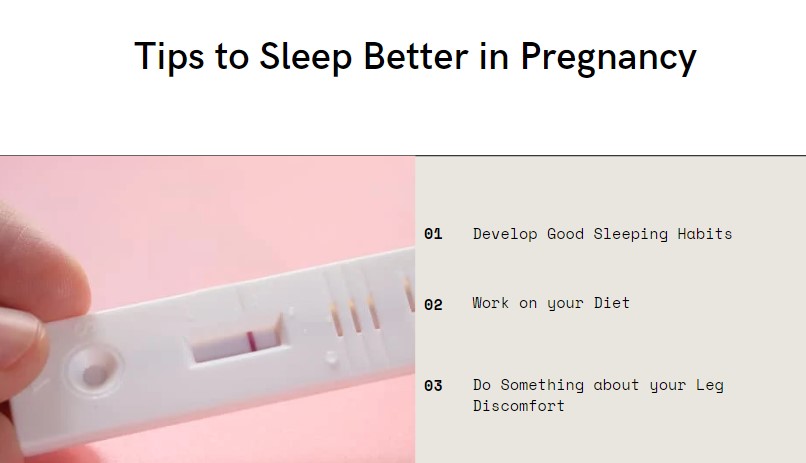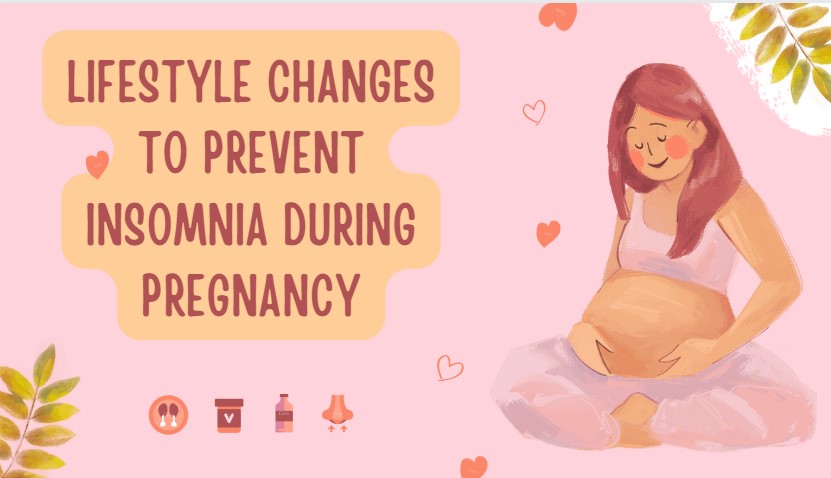Pregnancy is a lovely time in many ways, but your sleep schedule may be less than ideal throughout these nine months. A growing abdomen, aches, pains, and heartburn are common pregnancy symptoms for many women; these symptoms often keep them up long before a wailing, hungry baby enters the picture.
Insomnia During Pregnancy: What is it
When you struggle to get asleep, stay asleep, or both, it’s called insomnia. All phases of pregnancy can cause insomnia in women, but the first and third trimesters are often when it occurs more frequently. You may be spending more time outside of bed than in bed due to out-of-control hormones, heartburn and congestion during pregnancy, and late-night bathroom runs. But the good news is that your kid won’t be harmed by insomnia, despite how horrible it may be.
Simple logistics also come into play. Many pregnant women find it difficult to even get comfortable enough to sleep through the conclusion of their pregnancy. Although you may not have much of a baby bump to deal with during the first trimester, other concerns can keep you from getting a decent night’s sleep.
Insomnia During Pregnancy: Should you be worried?
A missed night of sleep during pregnancy isn’t normally a huge deal, but chronic sleep deprivation has been associated with gestational diabetes, stress, and melancholy. Insomnia and snoring have also been associated with an increased chance of having a baby who is too big or too tiny for his or her age. Sleep problems, specifically late in pregnancy, have been linked to lengthier labor and a greater need for a caesarean section.
How Long is Insomnia in Pregnancy
Pregnancy can cause insomnia and sleep disturbances at any time, so you can not get any sleep for weeks or months at a time with no clear end in sight. But instead of letting this sleep issue get to you, see your doctor for support and advice during your upcoming pregnancy visit.
What Causes Insomnia in Pregnancy

Depressed young woman lying in bed and feeeling upset after quarrel with her boylfriend in bedroom at home
According to doctors, difficulty falling asleep is common throughout pregnancy. An expanding belly, diaphragmatic pressure, frequent urination, gastroesophageal reflux disease (GERD), and restless legs syndrome (RLS) are just a few of the things keeping you from getting a good night’s sleep.
An increase in progesterone, a hormone produced by the ovaries and the placenta during pregnancy, can cause women to feel sleepier than usual as early as the first trimester. Fortunately, the second trimester often provides some relief. However, finding a comfortable sleeping position around the third trimester might be challenging. At this period, excessive levels of estrogen can also cause some women to develop swelling of the nasal tissue, which can be related to obstructive sleep apnea
Here are a few other causes of insomnia during pregnancy:
- Toilet runs
- Nausea
- Leg cramps
- Heartburn
- Backache
- Breast soreness
- Vivid dreams
Stress is one of the other possible reasons for insomnia. You may be worried about how you’ll manage work and motherhood and be nervous about labor and delivery. Although it may be challenging to stop thinking about these things, remember that worrying is useless. Try putting all of your worries in writing instead. This will allow you to think about potential fixes. Turn the page of your journal and move on to another concern if there is none or nothing you can do about it. You can relax by doing this to help clear your mind.
ALSO READ: VITAMIN P: ALL YOU NEED TO KNOW
Tips to Sleep Better in Pregnancy
After the kid is here, you’ll undoubtedly have a lot of sleepless nights, so make the most of your sleep now. Here are a few tips expectant mothers can use to sleep at night during pregnancy.
1. Develop Good Sleeping Habits
Developing sound sleep patterns is one of the finest things you can do to treat insomnia during pregnancy. Try to go to bed at the same hour every night to start. To help you relax, start your routine with something calming. Drinking warm milk before bed also helps.
Keep screen time to a minimum of one hour before bed. The blue light emitted by televisions, smartphones, and tablets might affect the circadian rhythm of your body. Instead, consider reading a book. Having a relaxing bath may also put you to sleep. Just watch out that it doesn’t become too hot—that could be harmful to your unborn child. This is especially important during the first trimester of pregnancy. So, steer clear of hot tubs for safety.
2. Work on your Diet
To lower your risk of experiencing heartburn, eat a nutritious dinner and try to eat it slowly. While eating dinner early can be beneficial, avoid going to bed hungry. Have a little snack if you must eat something late in the evening. You can maintain stable blood sugar levels during the night by eating something high in protein. As mentioned above, a warm glass of milk can induce sleep.
As for your beverages, sip a lot of water throughout the day, but limit your intake after 7 p.m. Avoid caffeine as much as possible, especially in the late afternoon.
ALSO READ: HIGH FUNCTIONING DEPRESSION – THE COMPLEXITIES, SIGNS, AND THE SOLUTION
3. Exercise
Getting some physical activity is also a good way to cure your insomnia during pregnancy. It’s a known fact that engaging in moderate aerobic exercise prolongs the duration of slow-wave sleep. Deep sleep, or slow wave sleep, gives the body and brain an opportunity to repair themselves. Moreover, exercise might help you relax and maintain a stable mood. So, in order to reap all these benefits of exercise, stay active during the day.
4. Do Something about your Leg Discomfort
Leg pain, including leg cramps and restless legs syndrome, is a common pregnancy symptom. Consider taking calcium supplements and doing mild stretches to lessen your risk of getting leg cramps. Calf stretches, walking, standing on the leg, pushing it against a wall, or wriggling and elevating the leg can all help control leg cramps at the moment.
5. Try Cognitive Behavioral Theory
Cognitive behavioral therapy for insomnia (CBT-I) involves working with a therapist to address any negative beliefs or behaviors that interfere with sleep. The therapist may address the patient’s worried thoughts, talk about reasonable targets for sleeping a specific amount of hours, and provide relaxation methods like progressive muscle relaxation and meditation to alleviate concerns about insufficient sleep. Research indicates that CBT-I can reduce symptoms of insomnia and enhance pregnant women’s sleep. It may also aid in reducing symptoms of despair, anxiety, and exhaustion.
6. Avoid sleep medication
Pregnant women are generally advised to refrain from using sleep medications, including melatonin pills. Melatonin production increases in pregnant women, particularly in the third trimester. Pregnant women’s bodies naturally produce melatonin, which passes via the placenta to reach the womb and helps in establishing the baby’s sleep-wake cycle. According to some experts, taking melatonin supplements could cause the newborn to receive too much melatonin, which could disrupt the normal development of the sleep-wake cycle. Therefore, before taking any medication, including melatonin supplements, pregnant women who are having trouble sleeping should consult their doctor.
Lifestyle Changes to Prevent Insomnia During Pregnancy
You don’t have to accept your sleeplessness that easily! Instead, think about a few of the numerous strategies you can employ to try in order to get rid of insomnia.
Sleeping Apps
Download some of the top-rated applications on your mobile phone that rely on self-guided meditation, natural sounds, or other forms of white noise if you want to improve your sleep quality.
Nasal strips
Nasal strips may make it easier for you to breathe at night if your pregnant nose is what’s making it difficult for you to fall asleep.
Make it dark and quiet
To prevent light that might be keeping you awake, think about investing in a machine that makes a soft sound and room-darkening curtains.
Get comfortable
During pregnancy, there’s no such thing as too many pillows. Use them to lean on, provide support when needed, or just to cuddle with (or, better yet, get a decent pregnancy pillow). Another option for relieving heartburn and staying on your back after the first trimester is to try sleeping upright in a recliner.
Adjust the temperature
Is it too cool in your bedroom? Is it too hot? Check the temperature and try to keep the room from becoming stuffy by opening the window; you’ll definitely get hotter at night.
Choose the left side for sleeping
It is easier for blood to reach the fetus and key organs when you sleep on your left side. In addition to being gentler on the heart and lungs, sleeping on one’s left side can also help lessen swelling in the legs and ankles. In late pregnancy, most doctors advise against sleeping on your back since there may be dangers for the developing baby.
Final Word
Most women will experience insomnia throughout their first trimester. Consider napping during the day if you’re struggling. However, wait to take any medications, supplements, or herbal sleep aids until you speak with your physician. If you’re finding it difficult to function because of your insomnia, your doctor might be able to prescribe a sedative that’s safe to take while pregnant.



